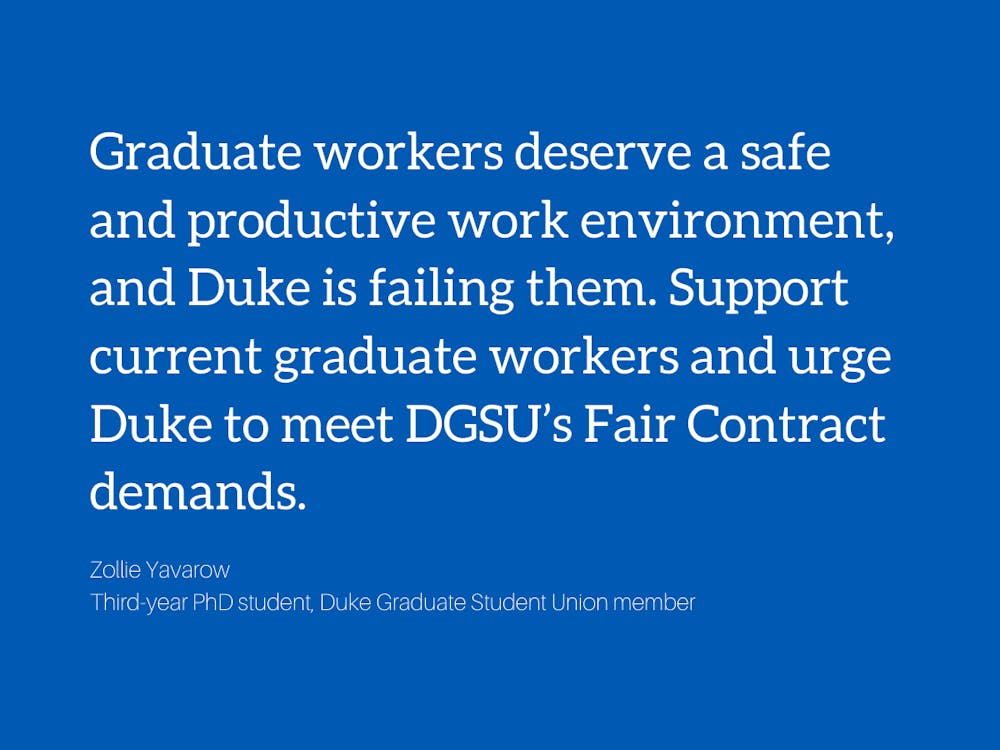One in five graduate students experience bullying in their workplaces and one in five experience harassment. Stop and think about that. This polling suggests that 30% of graduate students have experienced bullying or harassment—most of them women and nearly half at the hands of supervisors. These numbers are more than statistics to me. Harassment and discrimination are plaguing my world as a third year graduate student in Pharmacology and Cancer Biology (PCB) at Duke. Since leaving my research laboratory due to harassment and hearing similar stories from too many of my peers, it has become abundantly clear to me that Duke University’s current policies are insufficient to prevent harassment and discrimination.
As administrators and faculty engage in legal battles, graduate students are forgotten, and their lives and careers are forever changed. Mindful of the current climate, the Duke Graduate Student Union (DGSU) is asking for a basic protection for graduate students: “Guarantee a workplace free of harassment and discrimination.”
When each passing scandal hits, Duke claims to be intolerant of harassment and discrimination. Yet even with allegations confirmed, the perpetrating employees remain at Duke. This sends a message to perpetrators: we will tolerate your behavior here. Troublingly, this type of institutional tolerance is the greatest predictor of harassment and discrimination according to a report by the National Academies of Science, Engineering, and Medicine.
One problem is the limited scope of Duke’s definition of harassment and discrimination. Duke only prohibits harassment based on protected characteristics like race, sex, and religion. If a mentor persistently degrades the intelligence of their trainee or publicly berates them, this is not considered prohibited behavior, though it certainly creates a toxic work environment. Even when harassment and discrimination is based on a protected trait like gender, there may be little concrete evidence unless overtly sexist comments are made and it falls on the complainant to prove intent. DGSU is asking that Duke “expand the university’s definition of harassment and discrimination to protect all graduate workers from hostile, abusive, and intimidating work environments.”
In order to create harassment and discrimination-free work environments, Duke should implement comprehensive, regular trainings for faculty, administrators, staff, and students. Clicking through harassment and discrimination training slides and selecting obvious answers on a quiz does not constitute comprehensive training. Research shows that effective training is in-person and at least four hours long. Current in-person training sessions from OIE on harassment and discrimination do not demonstrate an understanding of the circumstances graduate students actually encounter, leading to “unproductive” and even “condescending” training experience according to a third year PhD candidate in PCB. To prevent misunderstanding or dereliction of reporting duty, I support DGSU’s demand to “require annual in-person harassment and discrimination training for all workers, managers, and mandatory reporters at Duke.”
Even when OIE confirms allegations of harassment and discrimination, it falls on the department itself—often the chair of the department—to act on the recommendations of OIE. Peers are not impartial judges and are likely to be overly lenient when (or if) acting on the recommendations of OIE. As a result, DGSU demands that Duke “design harassment and discrimination sanctions to protect the grievant, not the university” and “ultimately, institute an independent and neutral third-party grievance process.”
Graduate workers deserve a safe and productive work environment, and Duke is failing them. Support current graduate workers and urge Duke to meet DGSU’s Fair Contract demands.
Zollie Yavarow is a third year PhD student in Pharmacology and Cancer Biology and a member of the Duke Graduate Student Union.
Get The Chronicle straight to your inbox
Signup for our weekly newsletter. Cancel at any time.

